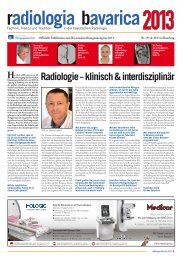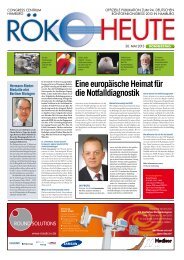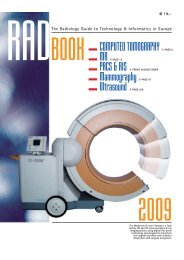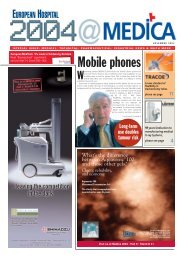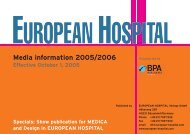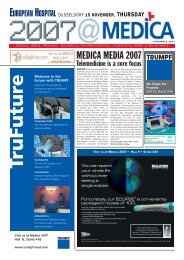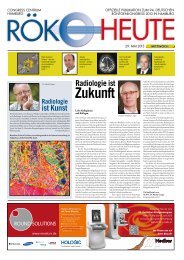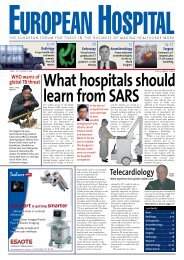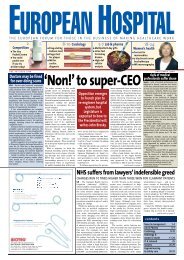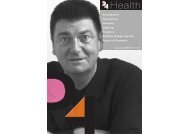PET scanning the heart cuts costs - European-Hospital
PET scanning the heart cuts costs - European-Hospital
PET scanning the heart cuts costs - European-Hospital
You also want an ePaper? Increase the reach of your titles
YUMPU automatically turns print PDFs into web optimized ePapers that Google loves.
CONTROVERSY: <strong>the</strong> nurse-surgeon<br />
Nurse-surgeon training in <strong>the</strong> UK, <strong>the</strong> lead story in <strong>European</strong> <strong>Hospital</strong>’s February<br />
issue, produced a lively response because o<strong>the</strong>r <strong>European</strong> countries are also training<br />
nurses to undertake certain surgical procedures to address <strong>the</strong>ir lack of qualified<br />
surgeons. The concept is not entirely new. In <strong>the</strong> 1970s <strong>the</strong> Ne<strong>the</strong>rlands introduced<br />
training for ‘operation assistants’, and <strong>the</strong> USA has had ‘registered nurse first<br />
assistants’ for 15 years. A ‘surgical assistant’ course began in Germany in 1999, and<br />
<strong>the</strong> first course for surgical assistants in cardiology was introduced this March.<br />
‘The General German Medical<br />
Council, <strong>the</strong> umbrella organisation<br />
that represents German doctors,<br />
was not prepared to make a<br />
statement on this subject.<br />
However, <strong>the</strong> Marburger Bund<br />
(Marburg Association) - with<br />
80,000+ members <strong>the</strong> largest<br />
organisation in Europe<br />
representing salaried doctors - was<br />
more forthcoming: Unfortunately,<br />
doctors (particularly hospital<br />
doctors) must carry out an<br />
increasing volume of non-medical<br />
work. But surely, <strong>the</strong> solution<br />
cannot be to remove <strong>the</strong>ir real<br />
medical work - particularly since it<br />
is difficult to recruit sufficient<br />
numbers of medical and nursing<br />
staff to begin with! It would make<br />
far more sense to relieve doctors of<br />
many documentation-related<br />
administrative tasks - about a<br />
third of <strong>the</strong>ir workload. Nonmedical<br />
staff, i.e. nurses, could<br />
carry out, for example, infusion<br />
<strong>the</strong>rapy, which <strong>the</strong>y used to do.<br />
Dr Udo Wolter, a member of <strong>the</strong><br />
Marburger Bund and President of<br />
<strong>the</strong> Brandenburg Medical Council,<br />
who specialises in hand and<br />
emergency surgery, is against<br />
nurse-surgeon training, arguing<br />
that, due to <strong>the</strong> ruling by <strong>the</strong><br />
<strong>European</strong> Court of Justice on<br />
hospital working hours (being oncall<br />
is considered time worked),<br />
assistants are left with less time to<br />
assist and learn to operate.<br />
‘Assistance through qualified<br />
doctors is <strong>the</strong> most important<br />
form of fur<strong>the</strong>r training,’ he said,<br />
adding that this must be ensured<br />
for future needs in general and<br />
specialist surgery. Although <strong>the</strong><br />
nurse-surgeon training aims to<br />
improve and continuously ensure<br />
<strong>the</strong> quality of surgical assistance -<br />
and provide surgery at a lower<br />
cost - young doctors could miss<br />
chances to pass <strong>the</strong>ir medical<br />
qualification in surgery: ‘No<br />
cardiac surgeon commenced<br />
his/her career with an organ<br />
transplant.’<br />
The Catholic Institute for<br />
Nursing, Marienhospital,<br />
Osnabrück provides conventional<br />
nursing training and, since 1999,<br />
has offered a course to train as<br />
operating <strong>the</strong>atre assistants (OTA).<br />
In March, Ulrich Barlag, Head of<br />
<strong>the</strong> Institute, and nursing<br />
academic, announced that in a<br />
new course, nurses working in<br />
operating <strong>the</strong>atres will be trained<br />
as second and first assistants for<br />
surgical interventions in<br />
cardiology, e.g. removal of a leg<br />
vein or preparation of <strong>the</strong> internal<br />
thoracic artery.<br />
Nine CAs (Chirurgie-Assistant)<br />
were trained during a pilot phase<br />
in 2001, and over 200 enquiries<br />
for places have been received for<br />
<strong>the</strong> first regular course, which will<br />
begin later this year. To qualify for<br />
acceptance, applicants must be<br />
qualified nurses or operating<br />
M-Z879-1-7600 Proven<br />
EH correspondent Holger Zorn reports<br />
Outcomes.<br />
www.siemens.com/medical<br />
Proven Outcomes that help you go fur<strong>the</strong>r.<br />
The most important question <strong>the</strong>se days is:<br />
what can we do to improve <strong>the</strong> quality of care while<br />
reducing <strong>costs</strong>? For us, <strong>the</strong> answer is clear. By combining<br />
trendsetting medical equipment with innovative IT we<br />
will increase <strong>the</strong> efficiency of clinical processes.<br />
At Siemens, we see a way – lots of ways – to help you go<br />
fur<strong>the</strong>r than ever before.<br />
We see a way to increase radiologists’ productivity by over 120 %<br />
We see a way to provide patients with CT-like comfort in a1.5T MRI<br />
Siemens Medical Solutions that help<br />
<strong>the</strong>atre assistants with 2-3 years<br />
experience in cardiosurgery, and<br />
must be familiar with all aspects of<br />
instrument handling.<br />
The six-month course will cover<br />
<strong>the</strong>ory and practice. Subjects:<br />
anatomy and physiology of <strong>the</strong><br />
lower extremities, diseases of <strong>the</strong><br />
arterial and venous systems and<br />
treatments, water and electrolyte<br />
metabolism plus blood coagulation<br />
and anticoagulation; intra and<br />
postoperative complications and<br />
wound-healing problems; <strong>the</strong><br />
Results may vary. Data on file.<br />
NEWS<br />
basics of HF surgery and <strong>the</strong> legal<br />
status of surgery assistants. A<br />
written exam will follow forty<br />
hours of <strong>the</strong>oretical study.<br />
The operating <strong>the</strong>atre<br />
programme is based on that for<br />
specialist surgery training for<br />
doctors. Typical vein removal will<br />
be demonstrated and practised on<br />
dummies and <strong>the</strong> students will be<br />
taught stitching and knotting<br />
techniques. They will also assist<br />
surgeons by removing leg veins in<br />
preparation for a bypass for 80-<br />
100 cases, all closely monitored by<br />
a mentor.<br />
Nurses who successfully<br />
complete all <strong>the</strong> categories will<br />
receive a certificate.<br />
EUROPEAN HOSPITAL Vol 14 Issue 2/05 3



